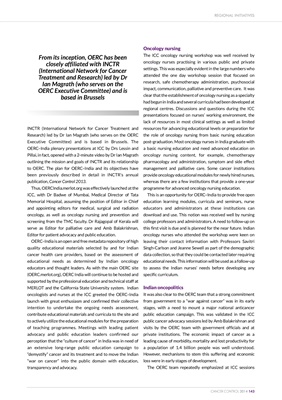
REGIONAL INITIATIVES
144 CANCER CONTROL 2014
that from the public health standpoint, cancer prevention and
early detection are overwhelmingly more cost-effective than
diagnosis and treatment of cancer in late stages. It is
estimated that greater than 70% of cancers are related to
preventable or reducible environmental and behavioural
factors such as use of tobacco products, betel nut, grilled and
smoked meats and fish, chemical preservatives, pollution of air
and water, sexually transmitted diseases, obesity, etc. A
national long-term cancer control plan, which focuses on
cancer prevention, public education and early detection
through effective screening, should be a top priority for
government and the public health and oncology communities
in order to lower cancer incidence, morbidity and mortality
over the coming decades. American observers pointed out
that in the United States, major progress against cancer began
in 1974 with President Nixon's "War Against Cancer", then 40
years of progress, and that India is now in the early stages of
this process and can benefit from our experience, our extant
cancer information and educational materials and that India
can accelerate progress leveraging the advanced state of
India's information technology.
A second aspect of Indian oncopolitics relates to the
tensions among the oncologic specialists - medical, surgical
and radiation oncology - some of whom are still debating the
relative importance and merits of their specialty-specific
management of cancers. Several of the ICC sessions discussed
the importance of interdisciplinary team management of
cancers, but this approach is lacking in all but the most
advanced cancer centres such as Tata Memorial, the All India
Institute of Medical Sciences and several leading regional
cancer centres. Some sessions at ICC gave the impression of
an "intellectual chauvinism" regarding the relative
contributions of surgery, radiation oncology and medical
oncology to cancer care, rather than committing to the
interdisciplinary care model, where pathologists, diagnostic
and interventional radiologists, molecular geneticists,
oncopsychologists, palliative care specialists and other
therapists all play a role in developing individualized
treatment plans for patients, and then carrying out the plan
according to consensus guidelines. This interdisciplinary care
approach will require the ongoing development of Indiaspecific consensus guidelines for the management of each
cancer type and stage, such as those developed by the NCCN
in the United States. Access to such guidelines and supporting
evidence-based materials can be assisted via
oercindia.merlot.org, a programme developed by and for
the Indian oncology educational community. l
Dr Lawrence S Lessin, MD, MACP is the Medical Director of
Washington Hospital Center's Department of Continuing Medical
Education and Quality Training (DCMEQT) and former Medical
Director of The Washington Cancer Institute, from 1993-2007. He
is one of the founding members of OERC and serves as chair of its
Executive Committee. He received his Doctorate in Medicine in
1962 from the University of Chicago School of Medicine,
completed postgraduate training in haematology and oncology at
the University of Pennsylvania's Hospital. Dr Lessin was awarded a
special fellowship from the National Institutes of Health in the
Institute for Cell Pathology at the University of Paris for advanced
research training. He research interests include anemias,
leukemias, myelodysplastic syndromes and other aspects of
haematologic malignancies resulting in over 150 journal articles,
book chapters and monographs. His has also held distinguished
roles such as Professor, Division Head and Medical Director within
prominent hospitals including Duke University Medical Center
(Durham, NC), Veterans Administration Hospital (Durham, NC),
and The George Washington University Medical Center (GWUMC)
and its Cancer Center (Washington, DC).
Dr Madhavan V Pillai, MD, FACP is an adjunct Professor of
Oncology at Thomas Jefferson University, Philadelphia, USA. He is
currently the Chairman of Astermedcity Oncology Center of
Excellence, Kochi, India and also the Chairman of the OERC-India
Task Force. Triple-board certified in internal medicine,
haematology and medical oncology he has extensive experience in
community oncology, the USAF Medical Corps and academia. He
serves on several national and international committees dealing
with cancer care.
Dr Savitri Singh-Carlson is currently the Assistant Director,
Graduate Program and Associate Professor in Nursing, California
State University, Long Beach, USA. She is an advocate for
international oncology nursing and has been involved in projects
that advance oncology nursing education at a global level. Her field
of research is on quality of life, cancer survivorship, palliative care
with diverse immigrant groups' perceptions and experiences of
cancer prevention, diagnosis and treatment.
Professor Jeanne Sewell is a nursing professor at Georgia College in
Milledgeville, Georgia, USA. She is also the Editor of the Health
Sciences Editorial Board for MERLOT (Multimedia Educational
Resources for Learning and Online Teaching and serves on the
Open Educational Resources for Cancer (OERC) India Executive
Steering Committee. She has a special interest in OERC prevention,
treatment, and survivorship.